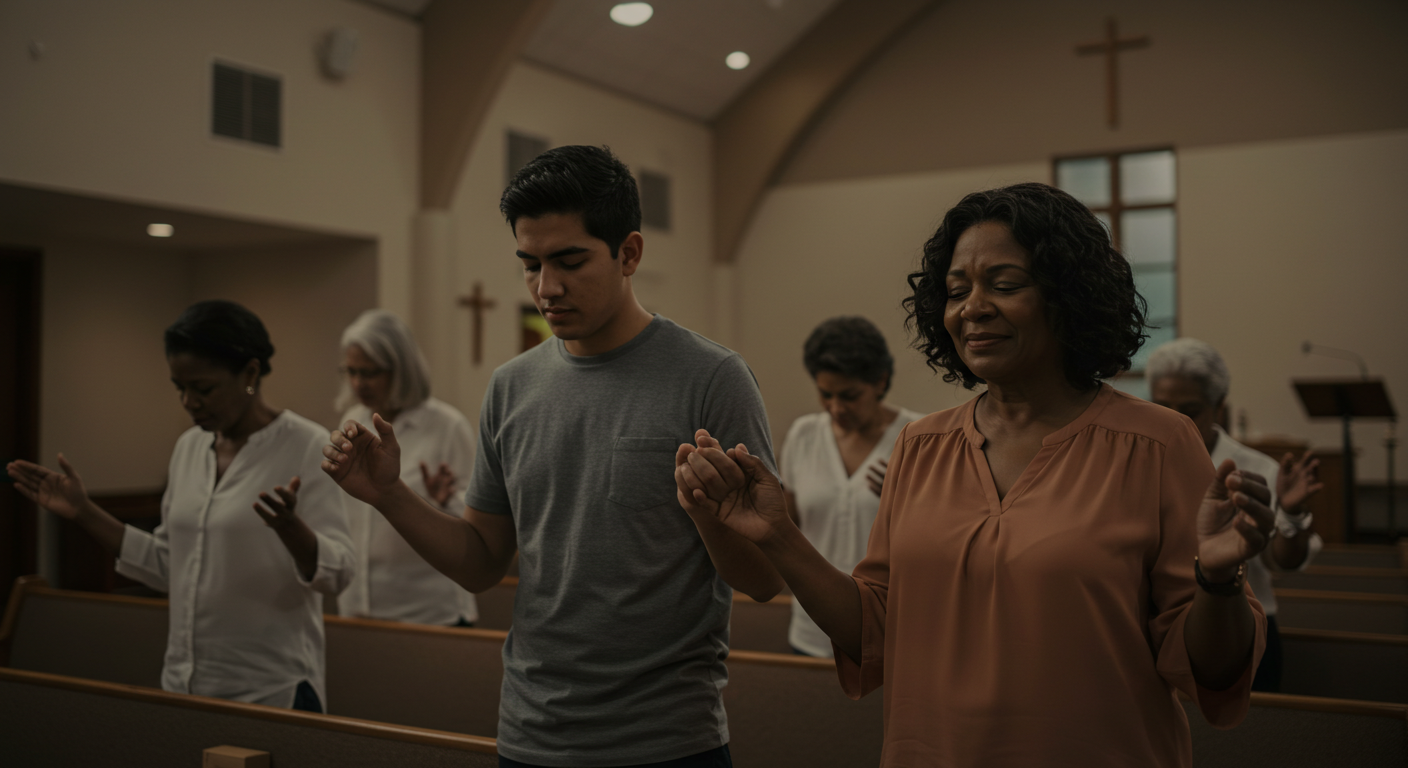The Church As Christ’s Hands And Feet On Earth
When you hear the phrase “Church as Christ’s body,” you might picture a building, a program, or a weekly meeting. But the biblical picture is far richer and far more active: the Church is the living, breathing presence of Christ in the world. You’re not just an attendee or a spectator—you’re part of a body that Jesus uses to touch, heal, feed, and point people toward God. That means the Church’s mission is both proclamation and practice: telling the gospel and embodying it by serving others. This article explores what it looks like when the Church becomes Christ’s hands and feet on earth, drawing on Scripture and practical steps you can take to participate in that mission today.
What “Church as Christ’s body” Means
When Paul writes that God placed all things under Christ’s feet and appointed him head over everything for the church, which is his body, he’s describing a profound reality: the Church is not an afterthought or a human invention; it’s the vehicle through which Christ rules and cares for the world. See Ephesians 1:22-23 for the heart of that idea: Ephesians 1:22-23. That means your life, gifts, and relationships are part of how Christ continues to act here and now. When you understand the Church as Christ’s body, you begin to see ministry as every believer’s responsibility—not just clergy or staff.
Jesus as the Model for Service
You learn how to be the Church as Christ’s body by looking at Jesus. He didn’t come to be served; he came to serve. You can see this most clearly in verses like Mark 10:45, where Jesus says he came to give his life as a ransom for many: Mark 10:45. And in an unforgettable, hands-on lesson, Jesus washed his disciples’ feet—telling them to do the same for one another: John 13:14-15. If the Church is to be Christ’s hands and feet, you must learn the language of humble service: listening, bending down, and performing tasks that others might overlook.
The Body Metaphor in Scripture
The metaphor of the body helps you understand both unity and diversity in the Church as Christ’s body. Paul explains that though the body has many parts, each part matters; no part can say to another, “I don’t need you.” See 1 Corinthians 12:12-27 for the full sweep of that teaching: 1 Corinthians 12:12-27. When you embrace this image, you realize your gifts—whether visible or quiet—are crucial to the whole. The Church works best when it recognizes the value of different roles and when you use your gifts for the benefit of others, not for recognition.
Christ as Head, the Church as Body
Understanding the relationship between Christ and the Church clarifies your direction. Paul calls Christ the head of the Church, and the Church his body—connected, dependent, and functioning under his authority. Colossians 1:18 highlights that Christ is the head of the body, the church: Colossians 1:18. Likewise, Ephesians 4:15-16 explains that growth happens when the body builds itself up in love through every supporting ligament: Ephesians 4:15-16. You don’t decide the mission alone; you move under Christ’s headship, relying on him for unity and growth.
The Great Commission: Proclaiming and Teaching
Part of being Christ’s hands and feet is telling others what you’ve seen and experienced. The Great Commission gives clear marching orders: make disciples, baptize, and teach what Jesus commanded. Read Matthew 28:18-20 and you’ll see that the mission of the Church as Christ’s body includes words and training, not just actions: Matthew 28:18-20. You’re called to live testimony—your life should open doors for gospel conversations, and your actions should give credibility to your words. Proclamation without care rings hollow; care without truth can lack direction. The healthiest expression of the Church as Christ’s body does both.
Empowered by the Spirit: Witness and Power
You can’t be the Church as Christ’s body in your own strength. The apostles were sent out with the promise of power from the Holy Spirit. Acts 1:8 says you will receive power when the Holy Spirit comes on you so you can be Christ’s witnesses: Acts 1:8. That power looks like courage, wisdom, and the supernatural fruit of God’s work—conviction of sin, transformation of hearts, and the establishment of communities that reflect God’s kingdom. You should expect your participation in the Church as Christ’s body to be both ordinary and empowered.
Serving the Poor and Marginalized
The Church as Christ’s body shows itself most clearly among the poor, the wounded, and the marginalized. Jesus makes a bold connection between serving “the least of these” and serving him personally in Matthew 25:35-40: Matthew 25:35-40. When you feed the hungry, clothe the naked, visit prisoners, or befriend the lonely, you’re not just doing charity—you’re living out the presence of Christ in someone’s life. Your acts of mercy are sacred and incarnational. The Church’s credibility is often measured by how it treats society’s most vulnerable.
Practical Compassion: How You Can Serve
Living out the Church as Christ’s body requires practical choices. You don’t need a perfect plan—start with your context. Volunteer at a local shelter, mentor a young person, help an elderly neighbor, or create an accessible space at your church for those with disabilities. James describes religion that is pure and faultless as caring for orphans and widows and keeping oneself from being polluted by the world: James 1:27. Your evangelism becomes far more believable when it is accompanied by concrete love. Small acts accumulate into a reputation of faithful service.
Loving Neighbor: The Good Samaritan Model
You can think of serving others as a daily practice of asking, “Who is my neighbor right now?” The parable of the Good Samaritan instructs you to cross cultural and social boundaries to care for someone in need: Luke 10:25-37. Being the Church as Christ’s body means you refuse to be paralyzed by “them vs. us” thinking. Instead, you see persons in need as opportunities to demonstrate Christ’s compassion. Your mercy might be inconvenient, costly, or surprising—but that’s often the point.
Unity and Diversity: Gifts for the Common Good
Your giftings matter because they serve others. Paul’s theology of spiritual gifts shows that different members have different roles for the common good. Romans 12:4-8 reminds you that though you are part of one body, you have different gifts according to God’s grace: Romans 12:4-8. Likewise, 1 Peter 4:10 tells you to use whatever gift you have received to serve others, as faithful stewards of God’s grace in its various forms: 1 Peter 4:10. If you’re a leader, encourage diversity and collaboration. If you feel overlooked, remember the body needs you.
How Community Shapes You
The Church as Christ’s body is not just a collection of individuals; it’s a formed community. Your spiritual formation happens in relationships—through accountability, service, shared worship, and communal confession. Hebrews 10:24-25 urges you not to neglect meeting together but to encourage one another toward love and good deeds: Hebrews 10:24-25. Community disciplines you in humility and generosity. When you join a small group, you practice the everyday life of the body: bearing burdens, giving encouragement, and learning to forgive.

Worship and Sacramental Life
Worship is not only an hour on Sunday; it’s a way of orienting your life to Christ’s rule. The early church devoted itself to teaching, fellowship, breaking of bread, and prayer, forming habits that sustained their witness: Acts 2:42. Participation in sacraments like baptism and the Lord’s Supper connects you to Jesus’ death and resurrection and to the global body of believers. Paul’s reflection on the Lord’s Supper reminds you that this meal proclaims the Lord’s death until he comes: 1 Corinthians 11:23-26. These practices form you to be Christ’s hands and feet.
Sharing Your Faith with Integrity
When you share faith with others, do so with gentleness and respect. 1 Peter 3:15 instructs you to always be prepared to answer everyone who asks you to give the reason for the hope that you have—but to do it with gentleness and respect: 1 Peter 3:15. The Church as Christ’s body wins trust when its witness is honest, non-coercive, and rooted in relationships. You’ll be more persuasive when your life aligns with your message: when your compassion, integrity, and justice embody the gospel you speak.
Overcoming Institutionalism and Burnout
Being Christ’s hands and feet doesn’t happen automatically because you have structures and programs. Churches can become institutions that protect themselves instead of serving others. You must continually ask whether your systems foster mission or safety. Paul warned of dangers like jealousy and division within the body; these undermine the Church’s witness (see 1 Corinthians 1:10-13): 1 Corinthians 1:10-13. Burnout is another enemy: serving without rest or community support robs you of joy and effectiveness. Sustainable ministry requires delegation, sabbath rhythms, and a culture that values renewal.
Healing and Reconciliation as Ministry
If the Church as Christ’s body is to heal the world, you must practice reconciliation. Jesus blesses peacemakers: “Blessed are the peacemakers, for they will be called children of God,” (Matthew 5:9): Matthew 5:9. Paul adds that God has given the ministry of reconciliation to the Church: you are ambassadors for Christ, imploring others to be reconciled to God (2 Corinthians 5:18-20): 2 Corinthians 5:18-20. Reconciliation requires truth, confession, forgiveness, and restorative practices. When you engage in these hard processes, you mirror the reconciling work of Christ.
The Church and Social Justice
The call to be Christ’s hands and feet includes addressing systemic injustices. Micah’s charge—do justice, love mercy, walk humbly with your God—reminds you that faithfulness involves social responsibility: Micah 6:8. You don’t need to be political in a partisan sense, but you should be attentive to structures that oppress and seek ways to advocate for fair treatment, dignity, and life-giving policies. The Church’s prophetic voice calls out injustice and champions the vulnerable, grounding activism in prayer and pastoral care.
The Sacrificial Nature of Service
Serving as the Church’s hands and feet often costs you something—time, reputation, resources, comfort. Jesus’ call to take up your cross involves sacrifice. You follow a Savior who gave himself for others, and the Church continues that pattern. Paul’s teaching in Philippians about having the mind of Christ—who humbled himself—helps you hold sacrifice in perspective: humility and sacrificial love are the currency of kingdom life. When you give sacrificially, you participate in the redemptive story of Christ’s love for the world.
The Role of Leadership in Shaping Mission
If you’re a leader, you set the tone for how the Church expresses itself as Christ’s body. Leadership that models servanthood, transparency, and accountability will foster a culture of participation. Ephesians 4:11-13 describes leaders equipping the saints for the work of ministry, building up the body: Ephesians 4:11-13. Good leaders multiply leaders—they don’t hoard ministry tasks. Your role is to release people into service, cultivate discipleship pathways, and create safe spaces where gifts can be discovered and exercised.
Eschatological Hope: Why Your Work Matters
You serve now because the story isn’t finished. The Church’s work as Christ’s body points to a future when God makes all things new. Revelation paints a picture of God dwelling with humanity—no more mourning, no more pain: Revelation 21:3-4. Paul reminds you that Christ’s resurrection guarantees the eventual restoration of all things: 1 Corinthians 15:20-22. The work you do as Christ’s hands and feet participates in that unfolding hope. That gives your service both urgency and humility—you act now, but you do so trusting God’s final victory.
Putting It All Together: Your Practical Roadmap
You can begin living as part of the Church as Christ’s body with intentional steps. First, deepen your relationship with Christ through prayer, Scripture, and community. Second, identify your gifts and seek ways to use them in your local church and neighborhood. Third, commit to practical acts of service—feeding someone, visiting, mentoring—that reflect Christ’s love. Fourth, practice evangelism with humility, letting your life and words work together. Fifth, engage in restorative practices that heal divisions and build trust. These steps won’t make you perfect, but they will make you faithful.
Final Encouragement
Being the Church as Christ’s body is less about programs and more about presence. Your posture matters: be attentive, compassionate, and brave. Expect to be shaped by community, to be corrected, and to grow. Remember that every small act of kindness, every gospel conversation, and every moment of faithful service contributes to a larger story—Christ’s ongoing work in the world. You are part of something bigger than yourself, and that gives daily tasks eternal significance.
Explore More
For further reading and encouragement, check out these posts:
👉 7 Bible Verses About Faith in Hard Times
👉 Job’s Faith: What We Can Learn From His Trials
👉 How To Trust God When Everything Falls Apart
👉 Why God Allows Suffering – A Biblical Perspective
👉 Faith Over Fear: How To Stand Strong In Uncertain Seasons
👉 How To Encourage Someone Struggling With Their Faith
👉 5 Prayers for Strength When You’re Feeling Weak

📘 Jesus and the Woman Caught in Adultery – Grace and Mercy Over Judgement
A powerful retelling of John 8:1-11. This book brings to life the depth of forgiveness, mercy, and God’s unwavering love.
👉 Check it now on Amazon
🌍 “Every great message deserves a home online.”
Don’t let your calling stay hidden. Start a Christian Blog/Website using Hostinger — with 99.9% uptime, free domain, and SSL, your voice can shine for God’s glory anytime, anywhere.
👉 Begin today. Try it RISK-FREE!
“Your body is God’s temple — care for it with purpose.”
Renew your energy and restore balance the natural way. Mitolyn helps support a healthy metabolism, giving you the vitality to live out God’s calling with strength and confidence.
🌿 Unlock Your Metabolic Power. Burn More Calories & Feel Great With Mitolyn.
👉 Start Today. Check Price Now.
As a ClickBank & Amazon Affiliate, I earn from qualifying purchases.
Acknowledgment: All Bible verses referenced in this article were accessed via Bible Gateway (or Bible Hub).
“Want to explore more? Check out our latest post on Why Jesus? and discover the life-changing truth of the Gospel!”






